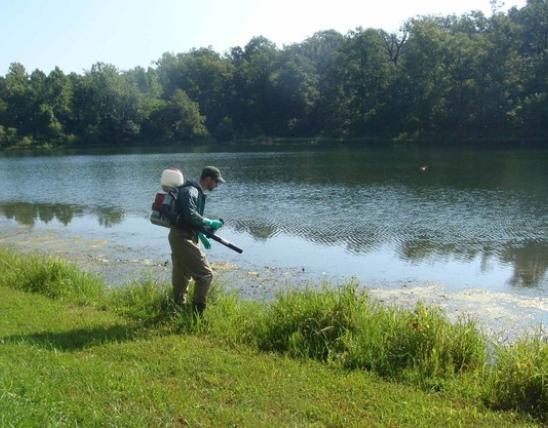They bite, suck, and scrape. Some can spread disease. This summer mosquitoes, ticks, and chiggers are out in full force. With some knowledge and prep, you can fend off these bloodsuckers and parasites and enjoy a great time in the outdoors. While chiggers and ticks are not insects, it's important to note that most insects are beneficial with less than 2% having any negative impacts on people, crops, and more.
Mosquitoes
Mosquitoes lay eggs in standing pools of water and come out in droves after a wet spring. The females bite and most are a nuisance, but some can spread disease like West Nile or Zika and cause heartworm in dogs. They will bite day or night, indoors or out. You can reduce them around your house by getting rid of standing water in clogged gutters, tires, flowerpots and other places where still water persists. Find prevention tips from our expert below.
Chiggers
On the plus side, chiggers eat mosquito eggs and are not known to carry disease. Missouri has chiggers everywhere in the state, in both wet and dry areas. They peak at dawn and dusk and on overcast and humid days. You may find them on woodlots, lawns, fields, parks and weedy riverbanks. You aren't likely to see them as they are nearly invisible. The larval children of adult chiggers are the ones that climb aboard us for their meals. Sitting and reclining on grass gives them easy access to many body parts. They actually scrape and puncture to make a meal of our tissue. Contrary to popular belief, they do not burrow under the skin. By the time you feel the itch, they have already fed and may be gone from the scratching. A scratched off chigger will not bite again. They will feed where the skin is thin and clothing tight. Get prevention and remedy tips from our expert below.
Ticks
Ticks are equal opportunity parasites. They will feed on mammals, birds, reptiles and amphibians. Many will find a different host animal at each life state. According to the CDC, they find their hosts by detecting breath or body odors or sensing body heat, moisture, and vibrations. Ticks will hitch a ride by doing something called questing. They may rest on the tips of grass or shrubs with a pair of legs outstretched to hitch a ride on a passing host. They can begin feeding between 10 minutes and two hours. Ticks can spread diseases like Rocky Mountain spotted fever, Lyme, and others. There's a new Asian longhorned tick that has appeared in the United States. It's not been found in Missouri yet, but has been found in Arkansas. It's essential to remove ticks immediately, and either save or be able to describe them to doctors if complications occur. Get prevention advice from our expert below.
Best Defense is a Good Offense Tips
How can you prepare for summer pests and best enjoy the outdoors? Ginger Miller with the Missouri Department of Conservation offers these tips to reduce bites:
- Avoid showering right before going outside. Shower immediately after being outside, and check for ticks.
- Apply mineral oil to your skin after bathing and reapply before going outside.
- Eat garlic and/or take B vitamins. They’ll make you less attractive to biting invertebrates and people because you’ll sweat them out and smell.
- Wear tall socks and pull them up over your pant legs and tape your shoes to your socks with duct tape. Wear old shoes or use new duct tape.
- Stand downwind of a campfire briefly. It will make you smell like smoke, but it will also make your less attractive to biting pests.
- Dust shoes/socks with flowers of sulphur powder, which helps prevent attacks from chiggers and reduce tick attacks.
- To avoid mosquitoes, cover yourself! Think thin long-sleeved top open in front so you can stay cool while preventing bites.
- To combat chiggers, generously sprinkle medicated powder in socks. Since chiggers are soft-bodied, you can also vigorously rub your clothes against your body every 20 minutes to squish any that have crawled on you before they cause irritation.
- Our bodies each smell differently and some of us are more attractive to pests. Try some things out and see what works for you. There are a variety of home remedies and repellents available to provide additional protection. Always read labels carefully and follow package directions!
- Permethrin must be applied to outer clothes only and in advance so that it dries before wearing items sprayed with it. Protection lasts through several washings. You can also send clothes to be dipped in it for protection lasting throughout the summer.
Learn more about how you can prevent ticks and mosquito bites from the CDC.








Recent Posts
























